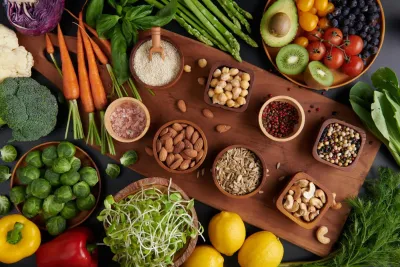Foods That Help You Sleep: A Guide to Bedtime Nutrition
Ana Marie Schick: Resident Sleep Expert and Certified Health Coach • Jan 31, 2024

Key Takeaways
Certain foods support better sleep by helping regulate melatonin, calm the nervous system, and keep blood sugar steady overnight. Choosing the right foods and timing them correctly can make it easier to fall asleep and stay asleep.
- Certain nutrients, including melatonin, magnesium, calcium, and tryptophan, play a direct role in regulating sleep and relaxation.
- Foods like yogurt, almonds, salmon, nuts, and turkey contain sleep-supporting compounds that may help improve sleep quality.
- Meal timing matters—lighter, balanced evening snacks are easier on digestion and less likely to disrupt sleep.
- Heavy, spicy, or high-sugar foods close to bedtime can interfere with sleep by affecting digestion, alertness, and body temperature.
- Diet works best alongside a sleep-friendly environment, and pairing smart food choices with a cool, comfortable bed can support deeper, more consistent rest.
Getting your body and mind settled down for a good night's sleep can often take some doing. Hectic workdays and busy home life can interfere, keeping us revved up and high-wired far into the nighttime hours. The next day? You guessed it. Fatigue, lack of concentration, and irritability put a wrench in your plans to be productive and enjoy your friends and family.
Yes, lack of sleep is a definite funbuster.
Eating the right foods may help you wind down and sleep more soundly, giving you more energy and better focus to tackle the next day's challenges. Furthermore, if exercise is in your routine, the good sleep you get at night has a major positive impact on meeting and exceeding your fitness goals.
Related Blog: Sleep hygiene plays an important role. Take a look at our blog on how you can improve your sleep hygiene.
We're diving into the fascinating world of nutritional science to uncover how certain foods can enhance your sleep. We all know that a good night's sleep is crucial for our health and well-being, yet so many of us struggle to achieve it.
Fortunately, there are a variety of foods that assist with promoting better sleep than counting sheep. Below, we will discuss different foods that help you sleep. Add them to your diet to help you get the sleep quality you deserve.
Enhance Your Sleep Beyond Diet
While incorporating foods for sleep is essential, don't overlook the impact of temperature. Experience better sleep with our cooling mattress pad. Make every night a journey to peaceful, quality sleep.
How Food Affects Sleep Quality at Night
Certain foods can enhance sleep due to their specific nutrients interacting with the body's sleep mechanisms. Foods rich in melatonin, such as cherries and nuts, help regulate our sleep-wake cycles.
Magnesium, found in almonds and spinach, is known for its relaxation effects and promotes sleep. Additionally, tryptophan, an amino acid in foods like turkey and milk, is crucial in increasing serotonin levels.
This, in turn, converts to melatonin, the hormone primarily responsible for sleep. These nutrients effectively influence the brain's chemistry and our internal clock, fostering relaxation and aiding in the onset of sleep.
Foods High in Melatonin
Melatonin is a very important hormone in regulating the circadian rhythm, also known as the sleep-wake cycle. The pineal gland releases melatonin when the time for sleep approaches. As morning approaches, melatonin levels decrease, signaling to the body that it is time to awaken.
Although melatonin production is affected by the cycle of darkness and light, certain foods and beverages contain high amounts of melatonin.
- Cherries that are tart
- Tart cherry juice
- Certain nuts (walnuts, almonds, pistachios)
Study: 16 oz of cherry juice could result in a decrease in insomnia. [1]
Research has determined that levels of melatonin production decrease with age. Thus, the increased nighttime awakenings, sleep disturbances, and poor sleep patterns that plague older adults may be directly related to the progressive depletion of this sleep hormone, resulting in poor sleep quality.
Magnesium Rich Foods
Magnesium helps to produce melatonin, that all-important sleep hormone. Additionally, it may play a role in reducing inflammation, which can improve sleep quality. Eating foods that contain high amounts of magnesium are:
- Nuts and seeds
- Legumes
- Seafood
- Leafy greens
- Bananas
Research also supports the value of magnesium as a factor in reducing cortisol, a stress hormone that can interrupt the sleep cycle. [2]
Foods High in Tryptophan
Tryptophan contains protein. Dairy products have high amounts of tryptophan. Meats such as turkey also contain tryptophan. (Although your ‘food coma' after Thanksgiving dinner was more likely due to the massive size of that yearly feast).
It plays a role in the production of serotonin, the end-product of which is melatonin.
- Cheese
- Turkey
- Chicken
- Fish
Related Blog: Does Turkey Make You Sleepy?
Here are some of the best sleep foods to eat that can help improve the quality of your sleep.

Foods That Support Natural Melatonin Production
Melatonin helps regulate your sleep-wake cycle. Some foods naturally support melatonin levels and can make it easier to feel sleepy at night.
Tart Cherries
Tart cherries are known to aid sleep because they are a natural source of melatonin, a hormone that regulates the sleep-wake cycle. They contain anti-inflammatory compounds and antioxidants, which may contribute to better sleep by reducing inflammation and oxidative stress in the body.
This combination of natural melatonin and anti-inflammatory properties makes these cherries a popular choice for those seeking to improve their sleep quality naturally. There are over 100 types of cherries, each rich in nutrients like vitamin C and potassium.
Research has shown that drinking tart cherry juice can positively impact sleep. In a particular study, [5] participants who consumed two cups of cherry juice daily experienced increased total sleep time and efficiency. Adding cherry juice to your diet seems to be a great way to enhance your sleep.
Oatmeal
Oatmeal is a great choice for promoting restful sleep. Despite being commonly eaten for breakfast, this whole grain won't lower serotonin levels like foods high in refined sugars. Instead of having a bowl of ice cream hours before bedtime, consider having a small bowl of oatmeal with fresh fruit.
Bonus: Oats contain compounds that support melatonin production and help promote a calm transition to sleep.
Kiwi
Did you know that eating this small, fuzzy-skinned fruit can promote better sleep? Well, it can! Kiwi supports natural sleep signals through its serotonin content and antioxidants, which may help you fall asleep faster and stay asleep longer.
Serotonin is a brain chemical that plays a key role in regulating sleep, while antioxidants help reduce inflammation and stress, which can interfere with sleep.
When combined, these nutrients help to relax the body and mind, making it easier to fall and stay asleep, and enjoy a restful night. So, if you're looking for a natural way to improve your sleep, consider adding kiwi to your diet.
Research has found that consuming two kiwis an hour before going to bed can significantly improve your sleep duration and quality. Participants in the study fell asleep more quickly and experienced a deeper, healthier sleep and spent more time sleeping overall. Adding kiwis to one's diet can improve sleep. [6]
Salmon
Salmon, as a fatty fish, is excellent for promoting a good night's rest. It supports sleep by providing vitamin D and omega-3s that help regulate melatonin and serotonin, while also offering protein that supports steady overnight energy.
Omega-3s also contribute to the production of melatonin, the hormone that helps regulate your sleep-wake cycle. Plus, the vitamin D content in salmon further supports sleep regulation.
Study: Over several months, the study found that individuals who consumed salmon three times per week experienced an improvement in their overall sleep quality and daytime functionality. [7]
Foods That Promote Relaxation Before Bed
Relaxation focused foods support muscles and the nervous system as your body prepares for sleep.
Almonds
Almonds provide magnesium, a mineral associated with muscle relaxation and improved sleep quality.
Many nuts are considered a super snack due to their healthy fats. Almonds, in particular, contain melatonin, a hormone that aids in sleep. Having a handful of these as an evening snack won't make you feel bloated and will leave you feeling satisfied.
Not a fan of almonds? That's ok, pistachios, walnuts, cashews, and pumpkin seeds are also great for healthy sleep. [4] So, what are you waiting for? Get your hands on some pumpkin seeds or other amazing snacks.
Tip: The Mediterranean diet focuses on filling your plate with primarily plant-based foods, including whole grains, vegetables, fruits, nuts, and seeds.
Bananas
Bananas are known to be one of the best foods for sleep because of their high levels of magnesium. Bananas also provide potassium, which supports muscle relaxation and nerve function, helping prevent nighttime muscle cramps for uninterrupted sleep.
Adding a banana to your nighttime routine can help promote a calming atmosphere, leading to better sleep. Bananas contain magnesium and potassium, which help reduce muscle tension and support a calmer state before bed.
These foods work best when eaten as part of a light evening snack rather than a heavy meal.
Did You Know: Bananas are a good source of sleep-promoting nutrients like magnesium, tryptophan, vitamin B6, carbs, and potassium, which have been linked to improved sleep quality.
Foods That Help Keep Blood Sugar Stable Overnight
Blood sugar swings during the night can lead to restlessness and unexpected wakeups. Balanced foods help prevent those drops.
Turkey
Turkey is known for promoting sleep due to its tryptophan content. How often have you heard that tryptophan sets in after a Thanksgiving meal?
It contains tryptophan, an amino acid for the production of melatonin and serotonin. Serotonin is a neurotransmitter that regulates your appetite and mood, while melatonin is a hormone that helps regulate sleep.
When you eat turkey, the tryptophan in it is converted to serotonin, which is then converted to melatonin. This leads to a sense of drowsiness and helps you sleep better.
In addition to tryptophan, turkey is also high in protein, which can further contribute to its sleep-promoting properties. Protein is important for building and repairing tissues in the body, and it can also help regulate blood sugar levels.
When blood sugar levels are stable, you are less likely to experience fluctuations in energy, which can interfere with sleep.

Low Fat Yogurt
Why does yogurt help with sleep? It combines protein and carbohydrates, helping prevent nighttime hunger and energy crashes. Yogurt is rich in calcium. Recent research suggests that adding calcium to your diet can help you fall asleep faster and lead to more restorative sleep. [3]
Yogurt also contains vitamin B6, vitamin B12, protein, and magnesium, which all contribute to better sleep. If you're concerned about the amount of sugar in yogurt, try to get one that is reduced sugar.
Did You Know: Research published in the Journal of Clinical Sleep Medicine found that a diet rich in fiber and low in saturated fat, while limiting refined carbohydrates, can enhance sleep quality, leading to deeper and more restorative rest.
Cottage Cheese
Cottage cheese is high in slow-digesting protein, which helps prevent blood sugar dips that can cause middle-of-the-night wakeups. A healthy snack option - eating it before bed can support better sleep because it's high in tryptophan, an essential amino acid for producing serotonin and melatonin. Serotonin helps regulate relaxation and mood, while melatonin controls our sleep-wake cycles.
Note: For all cheese lovers - try to avoid high fat cheeses leading up to bedtime.
It's easily digestible, and you can eat it on its own or add sliced bananas, raspberries, blueberries, blackberries, or other fruits mixed in. The benefits make it a popular go-to snack that can be eaten any time of the day, plus it's one of the best foods for sleep.
Low-fat cottage cheese also provides a good source of tryptophan, which supports the production of serotonin and melatonin.
White Rice
White rice, an everyday dietary staple, can be helpful for promoting sleep, because it has a high glycemic index. Foods with a high glycemic index may enhance sleep quality, as they potentially increase the production of tryptophan and serotonin in the brain.
Eating white rice a few hours before bedtime might contribute to falling asleep faster and experiencing a more restful night. However, it's important to balance it with a healthy diet for overall well-being.
If white rice isn’t your preference, brown rice can be a great alternative to support better sleep, as it also contains nutrients that promote relaxation.
Did You Know: White rice is a fast-digesting carbohydrate, which can help increase serotonin and support sleep onset when eaten earlier in the evening.

Try These Drinks, Which Can Help You Sleep
Now that you know which foods (including healthy fats) can help you fall asleep easily, there are drinks that can help you sleep. Some of them can significantly contribute to helping us relax and improve our sleep quality, including herbal tea, and warm milk.
Foods to Avoid Before Bed
Are you having trouble sleeping? You may be wondering if your diet is affecting your sleep. Find out which foods you should avoid or limit before bedtime. You might be surprised!
Tip: Some spicy foods can be difficult to digest, potentially causing you to wake up multiple times during the night.
Who Is Most Affected by Food Before Bed
Not everyone reacts to late-night eating the same way. Certain groups are more likely to feel the impact of food choices on sleep quality and night disruptions.
- People who sleep hot: Spicy, heavy, or alcohol-based foods can raise body temperature and make it harder to stay asleep.
- Menopausal and perimenopausal women: Hormonal shifts can amplify the effects of food on night sweats, temperature changes, and sleep interruptions.
- Light sleepers: Digestive activity, blood sugar swings, or mild discomfort can be enough to trigger wakeups.
- People sensitive to caffeine or sugar: Even small amounts later in the day can delay sleep or cause restless nights.
- Those with acid reflux: Eating too close to bedtime can worsen symptoms and disrupt sleep position and comfort.
Being aware of how food affects your sleep can help you make small changes that lead to more restful nights.
Conclusion: It's Time to Take the Journey
Nutritional and sleep science continues to change and evolve. We learn more about sleep hormones, nutrients, and the specialized neurotransmitters that relax, rejuvenate, and renew us every day. Steer clear of simple carbohydrates like bread, pasta, and sugary foods such as cookies, cakes, pastries, and similar foods. These can lower serotonin levels and are not conducive to promoting restful sleep.
One thing that all research is consistent about, however, is that there are a myriad of easy-to-get, inexpensive foods that help you sleep better at night and promote better sleep quality. What we have learned to help establish an excellent overall sleep routine is just as important.
Food and Sleep Frequently Asked Questions
What Are the Best Foods To Eat Before Bed for Better Sleep?
What Are the Best Foods To Eat Before Bed for Better Sleep? Load up on foods packing magnesium, tryptophan, and melatonin. Think bananas, almonds, turkey, and tart cherries. They're like nature's chill pills, helping you relax and ease into sleep.drift off
What Are Some Sleep-Friendly Snacks That Won’t Disrupt Digestion?
- A banana with almond butter
- Greek yogurt with honey
- Oatmeal with a splash of warm milk
- A small handful of pistachios
- A slice of whole grain toast with peanut butter
These snacks are light, rich in sleep-promoting nutrients, and easy on your gut.
What Are Some Healthy Evening Snacks?
Think snacks that satisfy and set you up for solid sleep. Go for combos that balance protein, healthy fats, and complex carbs—like Greek yogurt with a drizzle of honey, a banana with almond butter, or a handful of pistachios. These evening bites are nutrient-dense, sleep-friendly, and won’t wage war on your digestion.
What foods help you sleep better at night?
Foods that support melatonin, magnesium, and stable blood sugar may improve sleep quality.
How long before bed should you stop eating?
Most people sleep best when they finish eating two to three hours before bedtime.
Can food affect sleeping hot or night sweats?
Yes. Certain foods can raise body temperature and increase nighttime discomfort.
Peer-Reviewed Research References
-
Pigeon, W. R., et al.
Effects of a Tart Cherry Juice Beverage on the Sleep of Older Adults with Insomnia: A Pilot Study.
Journal of Medicinal Food, 2010.
Study Type: Pilot Clinical Study
Key Finding: Found that tart cherry juice consumption was associated with improvements in sleep duration and sleep efficiency among older adults with insomnia.
View Study
Source URL: https://www.liebertpub.com/doi/10.1089/jmf.2009.0096
-
Zeng, Y., et al.
Strategies of Functional Foods Promote Sleep in Human Being.
Current Signal Transduction Therapy, 2014.
Study Type: Narrative Review
Key Finding: Reviews evidence suggesting that certain functional foods and bioactive compounds may support sleep regulation through effects on neurotransmitters, circadian rhythm, and metabolic pathways.
View Study
Source URL: https://pmc.ncbi.nlm.nih.gov/articles/PMC4440346/
-
St-Onge, M. P., et al.
Exploring the Role of Dairy Products in Sleep Quality: From Population Studies to Mechanistic Evaluations.
Advances in Nutrition, 2023.
Study Type: Scientific Review
Key Finding: Summarizes observational and mechanistic evidence indicating that dairy foods may influence sleep quality through nutrients such as tryptophan, calcium, and bioactive peptides.
View Study
Source URL: https://pmc.ncbi.nlm.nih.gov/articles/PMC10229376/
-
Reiter, R. J., et al.
Melatonin in Walnuts: Influence on Levels of Melatonin and Total Antioxidant Capacity of Blood.
Nutrition, 2005.
Study Type: Experimental Nutrition Study
Key Finding: Demonstrated that walnut consumption increased circulating melatonin levels and total antioxidant capacity, suggesting a potential dietary contribution to circadian regulation and sleep-related physiology.
View Study
Source URL: https://www.sciencedirect.com/science/article/abs/pii/S0899900705001632
-
Losso, J. N., et al.
Pilot Study of Tart Cherry Juice for the Treatment of Insomnia and Investigation of Mechanisms.
American Journal of Therapeutics, 2018.
Study Type: Pilot Clinical Trial
Key Finding: Reported reductions in insomnia severity following tart cherry juice consumption, with proposed mechanisms involving anti-inflammatory effects and influences on tryptophan and melatonin pathways.
View Study
Source URL: https://pubmed.ncbi.nlm.nih.gov/28901958/
-
Lin, H. H., et al.
Effect of Kiwifruit Consumption on Sleep Quality in Adults with Sleep Problems.
Asia Pacific Journal of Clinical Nutrition, 2011.
Study Type: Interventional Nutrition Study
Key Finding: Reported improvements in sleep onset, duration, and efficiency following regular kiwifruit consumption in adults with self-reported sleep disturbances.
View Study
Source URL: https://pubmed.ncbi.nlm.nih.gov/21669584/
-
Hansen, A. L., et al.
Fish Consumption, Sleep, Daily Functioning, and Heart Rate Variability.
Journal of Clinical Sleep Medicine, 2014.
Study Type: Population-Based Observational Study
Key Finding: Found associations between higher fish consumption and improved sleep quality, daily functioning, and heart rate variability, potentially linked to omega-3 fatty acids and vitamin D intake.
View Study
Source URL: https://jcsm.aasm.org/doi/10.5664/jcsm.3714









